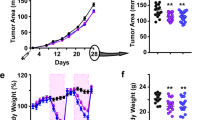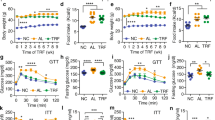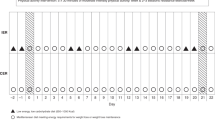Abstract
The aim of this study was to investigate the influence of dietary calorie intake at three different fat levels on (a) the growth of established methylnitrosourea (MNU)-induced mammary carcinoma, (b) the reappearance of mammary carcinomas after surgical removal, and (c) the growth of manifest lesions in animals treated with the cytostatic agent hexadecylphosphocholine (HPC). A reduction of calories by 30% significantly inhibited tumour growth of manifest mammary carcinomas in rats, without having a negative influence on body weight gain. After chemotherapeutic treatment no significant dietary influence was observed besides the high antineoplastic efficacy of HPC, but when feeding calorically restricted diets to surgically treated animals the number of reappearing tumours was considerably smaller (P = 0.06) than after feeding the diets ad libitum. The fat content of the diets did not influence the growth of manifest mammary carcinomas. No significant dietary effects were exerted on oestradiol or testosterone levels in untreated tumour bearing animals. An elevation of oestradiol levels was observed when animals were subjected to HPC and fed a high calorie diet. An elevation of testosterone levels was assessed after surgical treatment of the rats, irrespective of fat content and calorie level. Our results suggest that a reduction of calories can inhibit growth of manifest mammary carcinomas and has impeding effects on tumour development after surgical removal. After effective chemotherapeutic treatment the additional influence of dietary changes was of less relevance. Furthermore, our data do not establish any association between growth inhibition of mammary tumours, caused by the mild caloric restriction, and altered oestradiol or testosterone production.
This is a preview of subscription content, access via your institution
Access options
Subscribe to this journal
Receive 24 print issues and online access
$259.00 per year
only $10.79 per issue
Buy this article
- Purchase on Springer Link
- Instant access to full article PDF
Prices may be subject to local taxes which are calculated during checkout
Similar content being viewed by others
Author information
Authors and Affiliations
Rights and permissions
About this article
Cite this article
Bunk, B., Zhu, P., Klinga, K. et al. Influence of reducing luxury calories in the treatment of experimental mammary carcinoma. Br J Cancer 65, 845–851 (1992). https://doi.org/10.1038/bjc.1992.179
Issue Date:
DOI: https://doi.org/10.1038/bjc.1992.179
This article is cited by
-
The protective effect of intermittent calorie restriction on mammary tumorigenesis is not compromised by consumption of a high fat diet during refeeding
Breast Cancer Research and Treatment (2013)



